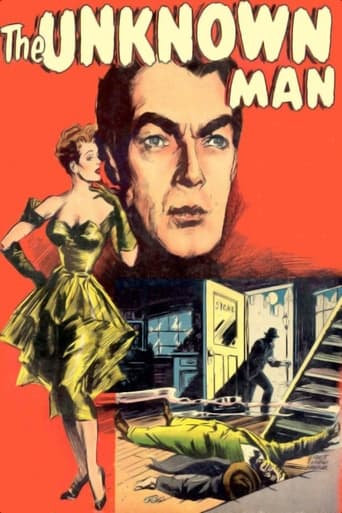irvberg2002
Walter Pigeon plays the part of a truly disgraceful lawyer. He agrees to represent a defendant in a murder case, thereby assuming a duty of loyalty to his client. In the course of the trial he succeeds in establishing that the key eyewitness against his client could not reasonably identify his client in view of the poor lighting conditions and, most important, that the witness need eyeglasses which he was not wearing at the time. Having demonstrated that there is not only lacking evidence establishing guilt beyond a reasonable doubt, but a virtual lack of any evidence of guilt at all, the verdict of acquittal is inevitable. Indeed, the case should never have even gone to the jury; the judge should have entered judgment for the accused at the close of the prosecution's case. Upon discovering that his client really did the deed, the lawyer proceeds to assume the defense of the client for a second murder, one that he, the lawyer, committed, not the client, and proceeds to secure a conviction by withholding evidence, i.e., his own testimony that he, not the client, committed the second murder. He then goes on to provoke the client into killing him by, in effect, taunting him by revealing that he is the one who committed the second murder and getting the client to believe that he is prepared to see the client will be punished for the murder he did not commit. It is hard to imagine a lawyer betraying his duty of loyalty to his client so blatantly.
blanche-2
Walter Pidgeon is Braley Mason, a civil attorney who takes on a criminal case in "The Unknown Man," a 1951 film also starring Ann Harding, Barry Sullivan, Keefe Braselle, and Richard Anderson. A great believer in justice, Pidgeon accepts a pro bono case defending a young man, Rudi Walchek (Braselle) accused of murder and gets him acquitted. Shortly afterward, he realizes that the man is guilty and was extorting protection money from his victim as well as other shopkeepers in the neighborhood. He is advised by the DA (Sullivan) that Rudi is small change, that to wipe out the organized crime, one has to find the top man. Mason finds the top man, and is faced with a dilemma."The Unknown Man" is a small, black and white film that manages to hold the viewer's interest with its various plot twists, though the plot is somewhat contrived. It's really the story of a good man seeking his god, justice, and what he is willing to do in order to attain it. And that's the most contrived part of all. I suppose there was a time before O.J., the Menendez Brothers, etc., etc., when people believed in justice and the integrity of attorneys. For this viewer anyway, those days are long over.Walter Pidgeon does an excellent job -- his handsome, elegant demeanor and declamatory voice show us a successful, confident man but also a deeply caring one. Pidgeon had a magnificent career spanning 60 years but never really rose to superstardom. He was a solid actor who could play just about anything and did. It may be because by the time he was getting leads, he was well into his thirties and missed being a matinée idol; or it could be he lacked that certain something; or that he was typed early on as second lead to a big female star like Greer Garson. Hard to say. He gives an honest and touching performance here.Very good movie with good performances.
eronavbj-1
I've seen this film criticized with the statement, "If you can get past the moralizing..." That misses the point. Moralizing is in the conscience of the beholder, as it were. This is a decent film with a standard murder mystery, but with a distinct twist that surfaces midway through. The resolution leaves the viewer wondering, "What would I have done in this position?" And I have to believe that's exactly what the filmmaker intended. To that end, and to the end of entertaining the audience, the film succeeds. I also like the way that the violence is never on stage, but just off camera. We know what has just happened; it's just not served up in front of us, then rubbed in our faces, as it would be today with contemporary blood and gore dressing. Besides, the violence is not the point. The point is the protagonist's moral dilemma, which is cleverly, albeit disturbingly, resolved.
bmacv
Prominent attorney Walter Pidgeon takes a murder case pro bono, wins an acquittal and discovers that his client (Keefe Braselle) was not only guilty but part of an extortion ring reaching to the highest eschelons of the city. Panged by his own complicity, he undertakes an investigation, stumbles onto the identity of the "unknown man" who heads the syndicate, and murders him.The ironies engage when Braselle is charged with this second murder and Pidgeon must defend him by pointing to the existence of another "unknown man" -- himself. Though somewhat short of urban grit and long on rhetoric, the Unknown Man belongs to the noir cycle less by style or structure than by its acknowledgement of the pervasive corruption of American municipal politics that came to light in the postwar years.



